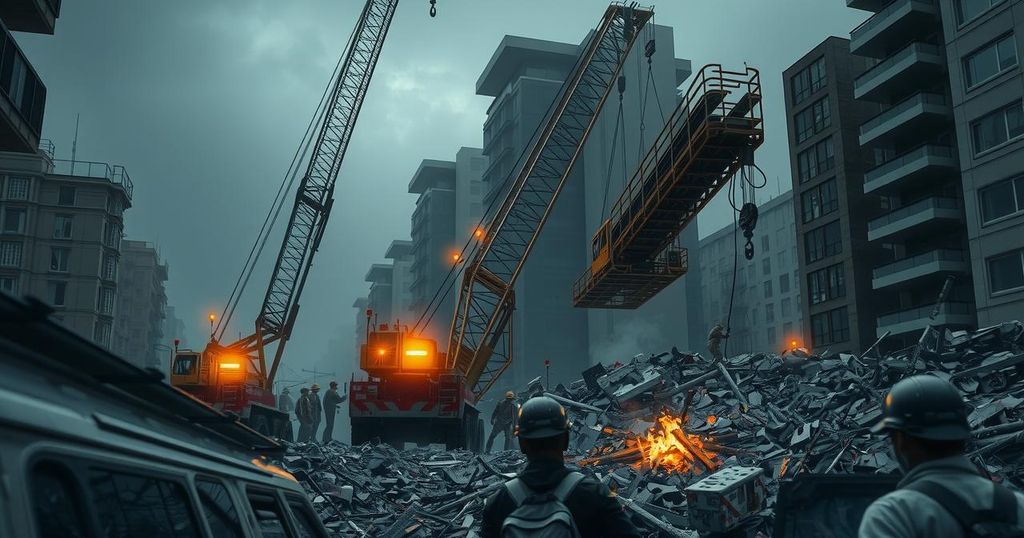Weather
ASIA, BANGKOK, DISASTER MANAGEMENT, EUROPE, FLOODING, FLOODS, GENEVA, JULIA REES, MARCO, MARCOLUIGI CORSI, MIN AUNG HLAING, MONSOON, MYANMAR, NAYPYITAW, OCHA, OFFICE FOR THE COORDINATION OF HUMANITARIAN AFFAIRS, RESCUE OPERATIONS, REUTERS, S OFFICE FOR THE COORDINATION OF HUMANITARIAN AFFAIRS, SWITZERLAND, THAILAND, U. N, UNICEF, WORLD HEALTH ORGANIZATION
Sofia Rodriguez
0 Comments
Myanmar Earthquake: Hope Amidst Rising Death Toll and Humanitarian Crisis
A powerful earthquake in Myanmar has led to a significant rise in fatalities, expected to exceed 3,000, while rescue efforts are hindered by severe shortages of basic resources and ongoing civil conflict. Significant efforts are being made to locate survivors, while multiple countries pledge humanitarian assistance amid concerns regarding the military government’s role in aid distribution.
A recent earthquake in Myanmar has resulted in a devastating death toll, anticipated to exceed 3,000 as reported by General Min Aung Hlaing. The earthquake, which measured 7.7 on the Richter scale, has claimed over 2,000 lives so far, in addition to leaving 441 people missing. Rescue efforts are challenging due to the ongoing civil war, complicating the humanitarian crisis in the region.
Rescue efforts continue, albeit under dire circumstances. Notably, a 63-year-old woman was rescued from a collapsed building, 91 hours after the earthquake struck. However, the U.N. has indicated that the window for finding survivors is rapidly closing, with essential supplies like shelter, clean water, and medicine in acute shortage. These shortages pose critical threats to the affected populations, many of whom are spending nights outdoors without electricity or running water.
The World Health Organization has recognized that over 10,000 buildings have either collapsed or suffered extensive damage. In Cambodia, the earthquake affected even a construction site in Bangkok, where there were fatalities and many individuals are still missing. Authorities are investigating potential design flaws linked to the high-rise’s collapse.
As rescue operations were briefly paused to honor those lost in the disaster, Myanmar’s fire department reported the rescue of several individuals, including children and a pregnant woman, from the ruins. Although foreign aid workers are arriving, difficulties remain due to insufficient machinery for rescue efforts. Several countries have pledged financial assistance to alleviate the crisis while international rescue teams have begun to arrive.
With the monsoon season approaching, the humanitarian situation is becoming increasingly severe. Prior to the earthquake, over 3 million people were displaced due to ongoing civil conflict, intensifying the need for humanitarian aid. Reports indicate that military operations continue against dissenters, despite a call for a unilateral ceasefire from the opposition National Unity Government, which has urged the international community to safeguard against potential interference by the military junta.
The international community is deeply concerned about the delivery of aid, especially in light of previous incidences where assistance was blocked. The military government has, however, stated an openness to accept aid post-disaster, presenting an opportunity for humanitarian efforts. Monitoring groups reiterate that ensuring the safety and delivery of aid is paramount for the survival of impacted lives amidst the ongoing turmoil.
The earthquake in Myanmar exacerbates an already critical humanitarian crisis caused by civil conflict. With a death toll projected to exceed 3,000 and rescue operations hampered by shortages and insecurity, the international community must remain vigilant in facilitating aid. The potential for disease outbreaks due to inadequate basic needs poses an additional threat. As rescue efforts continue, the imperative for timely and effective assistance remains urgent, amidst calls for cooperation to bypass military obstruction.
Original Source: www.cbsnews.com




Post Comment